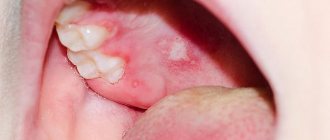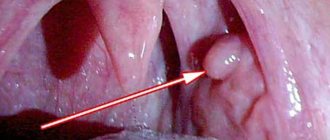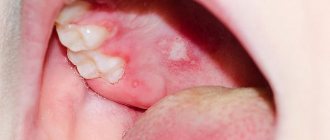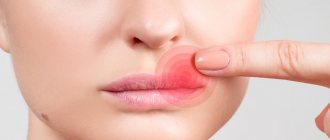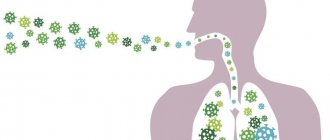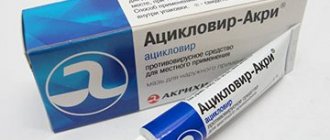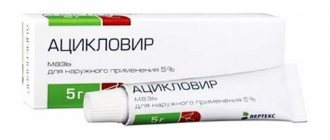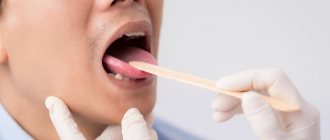Herpes on the tongue (herpetic glossitis) - signs of the disease and methods of its treatment
There are a huge number of taste buds on the surface of the tongue. They allow us to enjoy the taste of our favorite dishes and drinks, recognize the temperature and consistency of food. In addition, language plays a very direct role in human communication, allowing us to communicate with each other. The appearance of an organ alone can tell a lot about a person’s state of health. Thick plaque, redness, swelling, pain - all these are signs of certain disorders in the functioning of internal organs and systems, and these problems require medical intervention. One of the common diseases of the organ is glossitis. Today we’ll talk about a separate type of this pathology, namely herpes on the tongue or herpetic glossitis. Read on to find out whether herpes occurs in the mouth, what this form of the disease is, what symptoms are typical for it and how to cure it.
Symptoms of herpes on the oral mucosa
Symptoms of herpes are individual, have varying degrees of manifestation, and can occur in different parts of the oral cavity. For most cases, there are a number of signs that indicate the occurrence of herpes:
- Regular headache;
- Fever;
- A person gets tired quickly;
- Discomfort when eating and drinking;
- The appearance of water bubbles filled with transparent white or yellowish exudate, up to 3 mm in diameter;
- The appearance of ulcers at the site of burst blisters;
- Inflammation of the soft tissues of the oral cavity, redness, itching, burning, swelling of the lesion.
According to clinical studies, blisters in the mouth can form in different areas: on the palate, on the inside of the cheeks, on the tongue, on the gums, on the tonsils.
What is glossitis
Glossitis is an inflammatory pathology of the tongue, which often begins due to banal injury to the organ and penetration of harmful microorganisms through an open wound. Hence the widespread prevalence of this disease, because all of us at least once in our lives accidentally bit our tongues while eating or talking. Another common prerequisite for the development of the disease is insufficient oral hygiene, which leads to the active proliferation of bacteria.
The photo shows glossitis of the tongue
Pathology can be either an independent phenomenon or a consequence of complex problems in the functioning of the body as a whole or a specific dental disease. If you ignore obvious symptoms for too long, things can end up with very serious complications.
Stomatitis: how to overcome the “language barrier”?
Stomatitis on the tongue is just one of the manifestations of this “popular” disease. There are a huge number of reasons for its appearance, as well as ways to treat it.
There are several types of stomatitis, when it manifests itself specifically on the tongue: glossitis, viral stomatitis, vesicular stomatitis, enteroviral vesicular stomatitis, catarrhal stomatitis, fungal stomatitis, etc.
In general, stomatitis on the tongue is most common. Its notable feature is small ulcers, from which the patient suffers greatly. If inflammation is observed only on the tongue, and, for example, there are no signs of stomatitis on the palate, cheek or gum, then this disease is called glossitis.
Causes
The main provoking factors leading to the development of the disease in question have already been mentioned above. Let's look at all the most common causes of glossitis in more detail:
- damage to organ tissue: people often injure their tongue while eating, for example, with sunflower seed shells or fish bones. Injury can also result from accidental biting, the use of a worn-out prosthetic device, improper installation or adjustment of an orthodontic system to correct the bite, or damage to the mucosa from the sharp edges of a crown or filling. In addition, the cause of scratches and ulcers on the organ can be a burn or aggressive effects of acids contained in certain foods,
Tongue injury can cause pathology - long-term use of powerful medications, including antibiotics,
- allergies to hygiene products - toothpaste or mouthwash,
- disruptions in the functioning of the gastrointestinal tract: in this case, glossitis becomes a kind of symptom of a specific disease of the stomach or intestines, and here the help of a gastroenterologist will be needed,
- spread of infection - active spread of fungus or harmful bacteria in the oral cavity and esophagus,
- addiction to cigarettes and alcohol - the aggressive effects of tobacco smoke and alcohol on the oral mucosa in combination with a weakened immune system often leads to the development of various pathologies of the mucous membrane,
- acute deficiency of vitamins A and E.
This is what a fungal infection looks like on the tongue
. It is worth noting that glossitis quite rarely appears against the background of only one of the reasons described above. Typically, the development of pathology is facilitated by a whole range of problems associated with the condition of the oral cavity and the digestive tract, and injury to the organ becomes only a “trigger”. At risk are people whose professional activities involve constant contact with chemicals, as well as those who neglect to comply with hygiene rules.
Causes of oral herpes infection
Herpes that affects the oral cavity develops when infected with the herpes simplex virus type 1, which not only provokes the appearance of a blistering rash, but can also cause complications in 10% of cases. The second type of herpes virus (genital) also causes a rash in the mouth, but does not cause serious disruption to the body and differs in its mode of transmission (through sexual contact).
Most often, primary infection with a herpes virus occurs in childhood, after which it is introduced into the genome and remains in an inactive form for life.
The main routes of infection with a viral agent are close conversation, skin-to-skin contact, kissing, and the use of shared hygiene products or utensils. However, the entry of viral particles into the body does not guarantee that the disease will develop, since the immune system can suppress the action of the pathogen. In this case, situations that worsen the overall health of the body, on the contrary, provoke a clear manifestation of infection:
- surgical interventions;
- emotional and physical stress;
- lack of sleep, overwork;
- colds;
- chronic pathologies;
- long-term use of antibiotics;
- periods of menstruation, pregnancy or lactation;
- vitamin deficiencies;
- AIDS;
- abuse of nicotine or alcohol;
- the appearance of microtraumas from excessive exposure to the sun or frost.
Herpetic form - features
One of the most common forms of the pathology in question is the so-called herpetic or herpetic glossitis. In this case, the development of the disease is caused by the herpes simplex virus. A distinctive symptom of this type of disease is the appearance of rashes in the form of watery blisters that appear on the surface of the organ - they can appear at the tip, directly at the root, under the tongue and even on the frenulum.
Herpetic form of glossitis
The tumors are very painful and cause a burning sensation, especially when eating. Herpetic glossitis is a serious disease that requires timely treatment. Like the herpes virus, this disease is extremely contagious, so during treatment it is better to isolate the patient, if possible, from contact with other people.
Herpes virus type 8
Herpes virus type 8 can cause Kaposi's sarcoma and Castleman's disease. Kaposi's sarcoma is a serious pathology that is accompanied by the appearance of malignant skin tumors. It is quite difficult, especially with immune deficiency. May be complicated by inflammation of the mucous membrane of the palate and lymph nodes.
Castleman's disease is a rare disease in which fever, enlargement of the liver and spleen, anemia, and a sharp decrease in body weight are observed.
Appearance in children
The risk of developing herpes on a child’s tongue is increased by the fact that young children constantly put various objects in their mouths. Unfortunately, very often this disease manifests itself in children. In this case, the herpetic form of pathology is not the most common, because more often children have to deal with catarrhal inflammation, which is caused by injury to soft tissues due to constant biting, wearing an orthodontic plate and burns from eating too hot food.
“We had glossitis last winter. I noticed purple ulcers on the tip of my daughter’s tongue, I grabbed her and ran to the doctor. The child admitted to the dentist that her tongue began to tingle, but just the other day, that is, we managed to contact her at a very early stage. The doctor prescribed us pills and rinses with chamomile solution. We recovered in about a week.”
Oksana N., Omsk, from correspondence on the woman.ru forum
Stomatitis is common in infants.
An open wound on the oral mucosa opens a direct path for the penetration of harmful microorganisms. As a result of the development of the disease, the child may experience pain and burning in the organ. Another common type of glossitis in children is the candidal form - it occurs most often in the youngest.
Treatment of herpes in the mouth
Can herpes be in the mouth?
Maybe! Herpes in the mouth requires the same responsible approach and competent treatment as other diseases of the oral cavity. Despite the fact that the infection is often mild and goes away naturally, there are still risks of serious complications, and the possibility of infecting other people remains. Many factors influence the degree of development of the pathology and the presence of possible dangers for the patient. Complete diagnosis and comprehensive treatment can completely stop the manifestations of the infection, although complete elimination of the virus is considered impossible. Herpes, a viral disease known to many as a “cold sore,” is often perceived as a minor problem that does not require treatment. It is characterized by the appearance of a moderately painful blistering rash, but not many people know that this disease is not limited to appearing only on the lips , but can also develop on the oral mucosa . The disease is often accompanied by weakness, general malaise and severe itching, and in some cases can cause complications. During the active phase of the virus, a patient can easily infect others with it through household items, close contact or by airborne droplets.
During pregnancy
Glossitis in a pregnant woman usually develops against the background of weakened immune defenses of the body. The lack of a balanced diet coupled with a lack of vital vitamins and microelements often provokes vitamin deficiency, and glossitis becomes one of the associated pathologies. Other provoking factors during this period may be exacerbations of diseases of the gastrointestinal tract, as well as damage to the oral mucosa due to frequent vomiting against the background of toxicosis.
Treatment of the disease during pregnancy is carried out in such a way that the negative impact on the body of the mother and child is minimal. To do this, the specialist selects effective and at the same time safe medications, usually of local action - lozenges and lozenges, all kinds of rinsing solutions.
How is diagnostics carried out?
The appearance of neoplasms on the tongue of an adult or child should at least alert you. If redness, pain and swelling are added to everything else, it’s most likely glossitis. However, to make an accurate diagnosis and choose the appropriate treatment method, you must consult a doctor. Already as part of the initial visual examination, the specialist will be able to draw certain conclusions regarding the clinical picture, and to identify the specific cause of inflammation, it may be necessary to undergo the following types of examination:
- general blood analysis,
- blood chemistry,
- scraping from the damaged area.
Only tests can determine the true cause of the problem.
Only with the results of the studies in hand, the doctor will be able to make a final verdict and prescribe the necessary therapy. Do not self-medicate under any circumstances - such arrogance can lead to a worsening of the situation.
Diagnosis of herpes virus infections
The most informative laboratory tests for diagnosing herpesvirus infections are the PCR method and enzyme-linked immunosorbent assay. Depending on the location of the infectious process, blood, saliva, scrapings from the urethra, cervical canal, and vesicles can be examined.
During the diagnosis, the qualitative and quantitative content of immunoglobulins M and G is determined, as well as avidity, an indicator that can be used to assess how efficiently the immune system copes with the virus.
For more successful treatment, a general examination of the body is additionally performed to identify chronic infections. Sluggish chronic pathologies of the genitourinary, respiratory, digestive and other systems can support and cause exacerbation of herpesvirus infections.
How is the disease treated?
Treatment of herpes on the tongue can be quickly and effectively provided only by a doctor after making an accurate diagnosis and identifying a specific form of pathology. And in each individual case, the treatment method will largely depend on the individual clinical picture. Below are several general principles for combating the disease:
- elimination of all accompanying pathologies of the oral cavity - treatment of carious cavities, removal of plaque and dental deposits,
- rinsing with antiseptic solutions - Miramistin, Laripront, Chlorhexidine, Furacilin. If there is an advanced stage, the doctor may prescribe a course of antibiotics,
- compresses - it is recommended to smear the affected areas with products that promote wound healing and eliminate pain. Among such ointments are “Kamistad”, “Vinizol”, “Malavit”, “Solcoseryl” and others1,
- treatment with oils: experts advise treating the affected areas with oil, for example, rosehip or sea buckthorn - they perfectly help in normalizing the microflora of the oral cavity,
- multivitamin complexes: taking healthy vitamins and minerals is necessary to restore the body's defenses.
The recommendations described above are relevant for most forms of glossitis, however, targeted therapy is necessary to effectively eliminate the disease.
Herpes: what is it and what medications to use?
Herpes means “crawling” in Greek. At the moment, the relevance of this disease has not decreased. It occurs in more than 90% of the population.
What is herpes
Most often, problems are caused by herpes simplex virus types 1 and 2. Type 1 is herpes on the lips, eyes and mouth. Type 2 is genital herpes and herpes of pregnant women and newborns.
How to understand that it is herpes?
Let's take for example the most commonplace herpes on the lips. The first thing a person feels is itching in the lip area (often it may not be noticed during the day). On the same day, redness and red spots appear. The next day, a blister and swelling appear at the site of redness. After 3-5 days, a crust forms at the site of the burst blisters. After 7-9 days, all symptoms disappear. Also, during the stage with blisters, the temperature may rise to 37.5-38.5°C and pain may appear.
But to reliably confirm the diagnosis, a blood test is required to determine the presence of a specific reaction of the body to the virus (IgM); it will indicate that at the time of donating blood you are experiencing an acute period of illness.
For genital herpes, discharge from the genital tract and urethra is also taken for examination. Consultation with a specialist (dermatovenerologist) is required.
It is worth noting that the virus is not eliminated from the body after chickenpox, but remains to “live” in a certain part of our nervous system, so taking an Ig G test does not make sense.
How can you get infected?
Infection occurs through mucous membranes:
- lips
- Rta
- Nose
- Genitals
- Eyes
- Through the skin in contact with biological fluids (saliva, urine, semen, tears, nasal discharge, direct fluid from the herpes vesicle).
That is, most often infection occurs due to poor hygiene and protection during sexual intercourse. Also, when scratching the blisters that have already appeared, they spread to new areas of the skin and mucous membranes.
A separate route of infection from mother to fetus, currently testing for HSV-1.2 is mandatory in women planning pregnancy and pregnant women.
The infection affects the nervous system and has dangerous consequences for the body.
How to behave with herpes
- Do not touch the rash with your hands; if you touch it, wash your hands immediately.
- Use separate dishes, cosmetics, and towels.
- Refrain from kissing and sexual contact.
- Apply medicated gels and ointments with a cotton swab, not with your hands.
Be sure to treat!
To reliably confirm the diagnosis, it is necessary to undergo an analysis.
Drugs
Let us consider in detail the groups of drugs for treatment
- Antiviral:
- Zovirax
- Valtrex
- Famvir
- Groprinosin
This group of drugs acts directly on the cause, the virus itself. The course and dosage regimen are prescribed by the doctor after a comprehensive examination.
The drugs are well tolerated; they are contraindicated during pregnancy and breastfeeding. Use with caution and under medical supervision in persons with renal and hepatic insufficiency. For children, the dose is determined by the pediatrician based on weight.
2. Interferon preparations:
- Viferon
- Kipferon
- Reaferon EC lipint
When you get a herpes infection, there is a decrease in the production of your own interferon alpha, which means a decrease in the body's defenses against the virus.
This group has practically no contraindications. It is the main method of treating such a vulnerable group as pregnant and lactating women.
- Interferon inducers:
- Amiksin
- Cycloferon
- Anaferon
Used to stimulate the production of your own interferon and avoid aggravation of the course and spread of infection. Well tolerated. Contraindications for each drug are for a certain age indicated in the instructions.
- Local antibacterial and antiviral drugs:
- Grammidin
- Lysobacter
- Hexoral
These drugs are used for herpetic lesions of the oral mucosa, have an antibacterial, antiviral effect, and also relieve inflammation and relieve pain.
- Zovirax ointment and Zovirax Duo active
- Viferon
- Infagel
- Panavir
They have a local antiviral effect, Zovirax Duo Active in combination with the hormone hydrocortisone provides rapid relief from inflammation and, accordingly, pain, and also prevents the formation of new blisters. But since it contains a hormonal component, you need to read the instructions very carefully. Only from 12 years old. Before using any ointments and gels, it is necessary to cleanse the skin of cosmetics and impurities.
- Immunomodulators under the control of an immunogram:
- Polyoxidonium
- Lycopid
Only under the supervision of an immunologist.
- Painkillers:
- Nurofen
- Panadol
Relieves pain, inflammation and, if necessary, temperature.
- Antihistamines:
- Zodak
- Claritin
Helps avoid swelling.
- Vitamin complexes:
- Vitrum
- Complivit
- Selenium
- Zinc
- Vitamin C
You can also separately select a vaccine against herpes. It is indicated for adults who suffer from herpes more than 3 times a year and a high titer of antibodies, elderly people, and HIV-infected people. Also for children who have not had chickenpox.
Treatment for pregnant women is selected depending on the duration of pregnancy, strictly by an obstetrician-gynecologist and depends on the severity of the course!
Herpes is a complex problem. The cause of recurring or new herpes is a decrease in immunity and hormonal changes.
The main prevention is to maintain the functioning of the immune system:
- Complete nutrition
- Sufficient amount of meat, fish and vegetables.
- Taking complex vitamin preparations containing necessarily: zinc, vitamin A, E, C.
- It is necessary to monitor the level of iron in the blood.
- The largest organ of our immune system is the intestines; it is necessary to support its functioning and, if necessary, take pro- and prebiotics.
- Have a regular sexual partner and observe good hygiene.
- In case of frequent recurrence of infection, vaccinate during periods of “quiet” periods.
- People with systemic diseases (diabetes mellitus types 1, 2, etc.) need to control and maintain the underlying disease in the compensation stage.
Literature:
Federal clinical guidelines for the management of patients with genital herpes - Moscow 2015; Clinical guidelines for herpes simplex in adults - 2014;
Radar Directory
Dietary recommendations
During treatment, experts advise following a certain diet. You should avoid foods that irritate the mucous membrane. Here are some important recommendations:
- give up too solid foods,
- food should be at room temperature,
- eat only fresh fruits and vegetables,
- It is better to exclude hot spices and acidic foods,
- limit the number of cigarettes you smoke and give up alcohol,
- exclude pickles and smoked products.
You should also avoid sweets if possible. Excessive sugar consumption during this period can lead to intensive proliferation of microbes in the oral cavity.
4. Treatment of stomatitis
Stomatitis is treated by dentists.
In general, mouth ulcers usually go away in no longer than two weeks, even without treatment. If the causes of the ulcer are established, the doctor will be able to choose the appropriate treatment. If they are not known, the main therapy will be aimed at alleviating the symptoms of the disease.
The following measures can help relieve pain and inflammation in the mouth:
- You should avoid hot drinks and foods, as well as salty, hot, spicy foods and citrus fruits;
- For severe pain, you can take painkillers;
- Rinsing your mouth with cool water or a small amount of ice can help relieve the burning sensation in your mouth.
To treat an ulcer, which is aimed at eliminating discomfort and protecting against infection, your doctor may recommend drinking more water and rinsing your mouth with salt water. Local anesthesia (such as lidocaine) may relieve pain. But this method for treating stomatitis in children is not recommended. A mixture of hydrogen peroxide and water in a 1:1 ratio or regular baking soda and water can be applied pointwise to the ulcer area. In addition, dentists may prescribe pain-relieving medications and corticosteroid pastes that can protect the affected areas on the lips and gums. Anti-inflammatory pastes, gels and rinses treat ulcers quite effectively and help reduce swelling and pain. They are also effective for severe cases of herpes on days 3-4, when the virus has disappeared but inflammation remains.
In any case, you should consult your doctor before taking medications, as some medications have side effects and are not recommended for people with diabetes and other diseases.
Treatment of herpes
There is no cure for herpes as such. We can only recommend lubricating the area of inflammation with special ointments (usually they contain acyclovir) and applying ice.
Sometimes doctors prescribe antiviral pills for herpes. Some experts believe that they can shorten the healing time of cold sores.
Stomatitis is usually not particularly dangerous, but not all ulcers are harmless. In any case, if stomatitis, inflammation and ulcers do not go away within two weeks, you should definitely consult a doctor.
Possible complications
If no attempts are made to cure the disease, over time the lesion will spread further to the mucous membrane and will inevitably lead to serious health problems in general. In the worst case scenario, there may be a threat of an abscess, and it will have to be removed surgically. In this case, the person will experience throbbing painful sensations, and the tongue will increase in size, unevenly.
The photo shows a tongue abscess
How to treat a disease with folk remedies
Treatment of herpetic glossitis at home can only be as a concomitant therapy. To put an end to the problem once and for all, you need competent diagnosis and the help of a specialist. Let us remind you: only a doctor has the right to prescribe medications, and without his consent, you should under no circumstances make any attempts to cure the disease yourself. All this can end not only in vain, but also very disastrously.
If the specialist has given the go-ahead for the use of traditional methods, you should pay attention to medicinal herbs. For example, tea tree oil effectively promotes the restoration of mucosal tissue. Also, in the fight against glossitis, rinsing with a decoction of chamomile and a light solution of hydrogen peroxide have proven themselves to be excellent.
How is herpes transmitted to children?
The herpes virus is very common and lives in almost all living things. It is transmitted by airborne droplets and contact . Once the herpes virus enters the body, it remains there for life. However, it can be in a “sleeping” state and not bother a person. If the herpes virus in a child has made itself felt, parents need to pay attention to this problem, because some herpes infections can take forms that are dangerous to health.
Children become infected with the herpes virus more often than adults, but overprotecting a child from infection is pointless and harmful. immunity to it . But the body is safe only in a situation where the infection is easy and without complications.
Preventive measures
To avoid the development of such an unpleasant and even dangerous disease as herpetic glossitis, you should adhere to the following tips and recommendations:
- you need to carefully care for your oral cavity, brush your teeth and tongue twice a day, rinse your mouth every time after eating,
- It’s better to stop smoking and drinking alcohol at least for a while,
- it is necessary to carefully control your diet, avoid too salty, spicy and sour foods, cold and hot dishes and drinks,
- it is important to regularly undergo preventive examinations not only with a dentist, but also with a gastroenterologist and immunologist,
- At the first symptoms of pathology, you should immediately seek medical help.
Regular brushing of teeth and tongue will help reduce the risk of disease.
Any form of glossitis, including herpetic, in the vast majority of cases develops against a background of weakened immunity. Therefore, an equally important condition for maintaining complete disease prevention is a healthy lifestyle. Walk outdoors more often, play sports, eat right, and don’t forget to take a responsible approach to oral hygiene.
- Borovsky A.L. Diseases of the mucous membrane of the oral cavity and lips, 2001.
Features of herpetic infections
Herpes is a viral infection that is characterized by a variety of clinical manifestations and can affect various systems, organs, and tissues:
- nervous system;
- genitourinary system;
- skin and mucous membranes;
- eyes.
Herpetic infections are characterized by lifelong persistence—preservation in the host’s body. With any weakening of the immune system, the virus reactivates and the disease worsens. Exacerbation of infection can be caused by a variety of factors:
- overwork;
- hypothermia;
- stress;
- inadequate sleep;
- change in the climatic zone of residence;
- solar insolation;
- colds.
The severity of symptoms depends on the type and form of the virus. When the nervous system is damaged, the disease can lead to inflammation of the membranes of the spinal cord and brain and other dangerous complications. Therefore, it is very important to diagnose the infection in time and begin adequate therapy.
